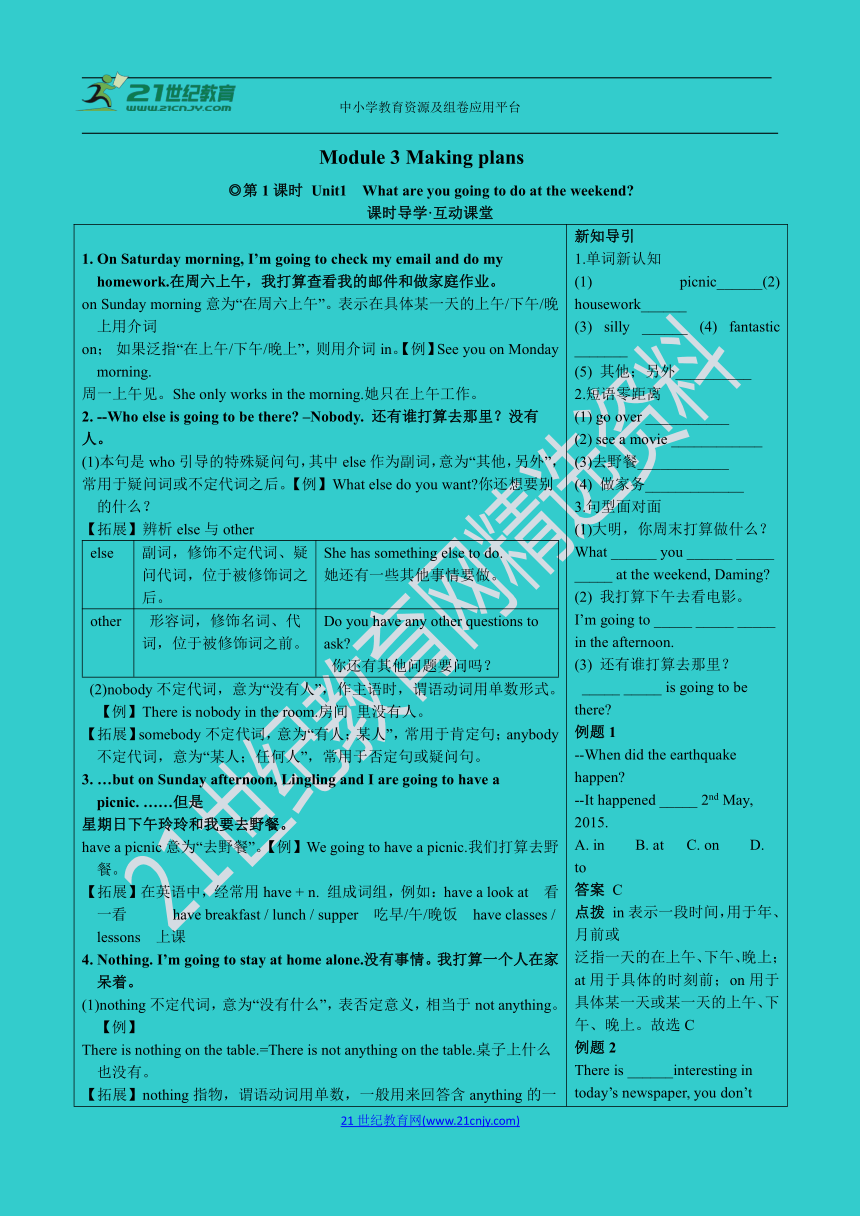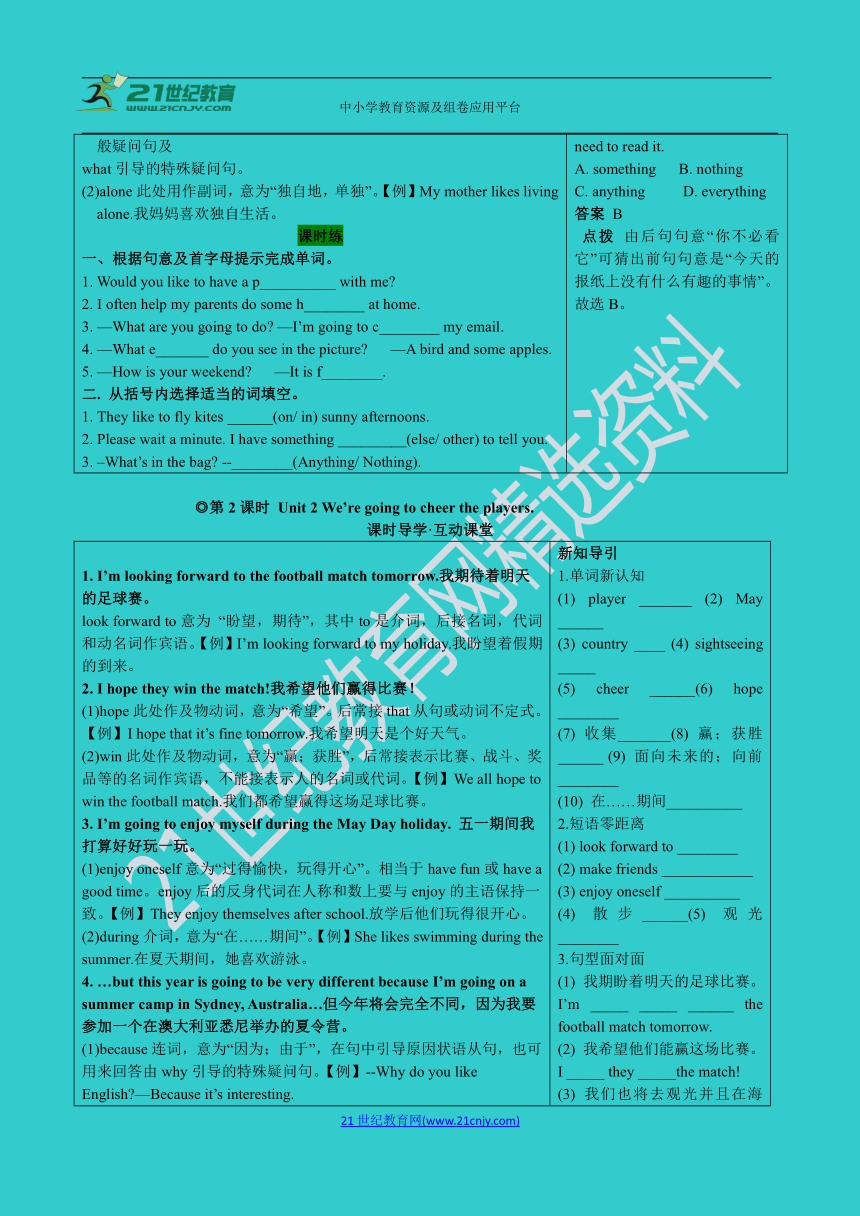Module 3 Making plans 全模块同步学案(含答案)
文档属性
| 名称 | Module 3 Making plans 全模块同步学案(含答案) |

|
|
| 格式 | zip | ||
| 文件大小 | 2.9MB | ||
| 资源类型 | 试卷 | ||
| 版本资源 | 外研版 | ||
| 科目 | 英语 | ||
| 更新时间 | 2019-03-06 00:00:00 | ||
图片预览



文档简介
中小学教育资源及组卷应用平台
Module 3 Making plans
◎第1课时 Unit1 What are you going to do at the weekend?
课时导学·互动课堂
1. On Saturday mornin (?http:?/??/?www.21cnjy.com?)g, I’m going to check my email and do my homework.在周六上午,我打算查看我的邮件和做家庭作业。on Sunday mor (?http:?/??/?www.21cnjy.com?)ning意为“在周六上午”。表示在具体某一天的上午/下午/晚上用介词 on; 如果泛指“在上午/下午/晚上”,则用介词in。【例】See you on Monday morning.周一上午见。She only works in the morning.她只在上午工作。2. --Who else is going to be there? –Nobody. 还有谁打算去那里?没有人。(1)本句是who引导的特殊疑问句,其中else作为副词,意为“其他,另外”,常用于疑问词或不定代词之后。【例】What else do you want?你还想要别的什么?【拓展】辨析else与other else副词,修饰不定代词、疑问代词,位于被修饰词之后。 She has something else to do.她还有一些其他事情要做。 other 形容词,修饰名词、代词,位于被修饰词之前。 Do you have any other questions to ask?你还有其他问题要问吗? (2)nobody不定代词,意为“没有人”,作主语时,谓语动词用单数形式。【例】There is nobody in the room.房间 里没有人。【拓展】somebody不定代词,意为“有人;某人”,常用于肯定句;anybody不定代词,意为“某人;任何人”,常用于否定句或疑问句。3. …but on Sunday (?http:?/??/?www.21cnjy.com?) afternoon, Lingling and I are going to have a picnic. ……但是星期日下午玲玲和我要去野餐。have a picnic意为“去野餐”。【例】We going to have a picnic.我们打算去野餐。【拓展】在英语中,经常用have + n. 组成词组,例如:have a look at 看一看 have breakfast / lunch / supper 吃早/午/晚饭 have classes / lessons 上课 4. Nothing. I’m going to stay at home alone.没有事情。我打算一个人在家呆着。(1)nothing不定代词,意为“没有什么”,表否定意义,相当于not anything。【例】 There is nothing on the table.=There is not anything on the table.桌子上什么也没有。【拓展】nothing指物,谓语动词用单数,一般用来回答含anything的一般疑问句及 what引导的特殊疑问句。 (2)alone此处用作副词,意为“独自地,单独”。【例】My mother likes living alone.我妈妈喜欢独自生活。课时练一、根据句意及首字母提示完成单词。 1. Would you like to have a p__________ with me? 2. I often help my parents do some h________ at home. 3. —What are you going to do? —I’m going to c________ my email. 4. —What e_______ do you see in the picture? —A bird and some apples. 5. —How is your weekend? —It is f________. 二. 从括号内选择适当的词填空。 1.?They like to fly kites ______(on/ in) sunny afternoons. 2. Please wait a minute. I have something _________(else/ other) to tell you. 3. –What’s in the bag? --________(Anything/ Nothing). 新知导引1.单词新认知 (1) picnic______(2) housework______ (3) silly ______ (4) fantastic _______ (5) 其他;另外__________ 2.短语零距离 (1) go over ___________ (2) see a movie ____________ (3)去野餐____________ (4) 做家务_____________ 3.句型面对面 (1)大明,你周末打算做什么? What ______ you ______ _____ _____ at the weekend, Daming? (2) 我打算下午去看电影。 I’m going to _____ _____ _____ in the afternoon. (3) 还有谁打算去那里? _____ _____ is going to be there?例题1 --When did the earthquake happen? --It happened _____ 2nd May, 2015. A. in B. at C. on D. to答案 C点拨 in表示一段时间,用于年、月前或泛指一天的在上午、下午、晚上;at用于具体的时刻前;on用于具体某一天或某一天的上午、下午、晚上。故选C例题2There is ______interesting in today’s newspaper, you don’t need to read it. A. something B. nothing C. anything D. everything答案 B点拨 由后句句意“你不必看它”可猜出前句句意是“今天的报纸上没有什么有趣的事情”。故选B。
◎第2课时 Unit 2 We’re going to cheer the players.
课时导学·互动课堂
1. I’m looking forward to the football match tomorrow.我期待着明天的足球赛。look forward to意为 “盼望,期待”,其中to是介词,后接名词,代词和动名词作宾语。【例】I’m looking forward to my holiday.我盼望着假期的到来。2. I hope they win the match!我希望他们赢得比赛!(1)hope此处作及物动词,意为“希望”。后常接that从句或动词不定式。【例】I hope that it’s fine tomorrow.我希望明天是个好天气。 (2)win此处作及物动词,意为“赢;获胜”,后常接表示比赛、战斗、奖品等的名词作宾语,不能接表示人的名词或代词。【例】We all hope to win the football match.我们都希望赢得这场足球比赛。3. I’m going to enjoy myself during the May Day holiday. 五一期间我打算好好玩一玩。(1)enjoy onesel (?http:?/??/?www.21cnjy.com?)f意为“过得愉快,玩得开心”。相当于have fun或have a good time。enjoy后的反身代词在人称和数上要与enjoy的主语保持一致。【例】They enjoy themselves after school.放学后他们玩得很开心。 (2)during介词,意为“在……期间”。【例】She likes swimming during the summer.在夏天期间,她喜欢游泳。 4. …but this year is going to be very different because I’m going on a summer camp in Sydney, Australia…但今年将会完全不同,因为我要参加一个在澳大利亚悉尼举办的夏令营。(1)because连词,意为“因为;由于”,在句中引导原因状语从句,也可用来回答由why引导的特殊疑问句。【例】--Why do you like English?—Because it’s interesting. --你为什么喜欢英语?因为它有趣。 (2)go on a summer camp意为“去参加夏令营”。【例】I’m going on a summer camp next week.下周我要去参加夏令营。一. 用所给词的适当形式填空。 1. Emily would like________(visit)the Palace Museum. 2. I have an______(Australia)pen friend. Her name is Jenny. 3. We can go________(sightsee)around the city after the meeting. 4. I enjoyed________(I)at the party last night. 5. We’re looking forward to________(go)to Disneyland with my parents. 二. 单项选择。 1. Jim is going to stay at home ______ it is raining outside. A. so B. because C. and D. but 2. —I’m going to Hawaii with my uncle this month for my holiday. —______! A. Have a good time B. Best wishes to you C. Congratulations D. Please go 3. 1. I hope they ________ the game. A. win B. to win C. wins D. are win 4. They __________ a funny movie tomorrow. A. watches B. watching C. watch D. are going to watch 5. He enjoys__________ books. A. read B. reads C. reading D. to read 新知导引1.单词新认知 (1) player _______ (2) May ______ (3) country ____ (4) sightseeing _____ (5) cheer ______(6) hope ________ (7) 收集_______(8) 赢;获胜______ (9) 面向未来的;向前________ (10) 在……期间__________ 2.短语零距离 (1) look forward to ________ (2) make friends ____________ (3) enjoy oneself __________ (4) 散步______(5) 观光________ 3.句型面对面 (1) 我期盼着明天的足球比赛。 I’m _____ _____ ______ the football match tomorrow. (2) 我希望他们能赢这场比赛。 I _____ they _____the match! (3) 我们也将去观光并且在海滩上野餐。We’re also ______ _____and going to have a picnic_____ _____ _____. 例题 1 Yunan is beautiful and I’m looking forward _____ _____ it again. A. to visiting B. to visit C. at visiting D. at visit答案 A点拨 look forward to意为“盼望,期待”,是固定短语,其中to是介词,后接名词,代词和动名词作宾语。故选A。例题 2 —Why is she goin (?http:?/??/?www.21cnjy.com?)g to England? —______she wants to see Big Ben herself. A. Because B. But C. Then D. And答案 A点拨 because连词,意为“因为;由于”,用来回答由why引导的特殊疑问句。故选A。
◎第3课时 Unit 3 Language in use
课时导学·互动课堂
1. … it’s time for homework!……是做家庭作业的时间了!It’s time for sth. 是固定句式,相当于It’s time to do sth.。意为“该做某事了;到做某事的时间了”,for是介词后接名词。【例】It’s time for dinner.=It’s time to have dinner.到吃晚饭的时间了。2. What are you going to do at the weekend?周末你打算做什么?这是一个含be going to 结构的特殊疑问句。【拓展】 一般将来时:be going to (1)用法:表示按计划或安排要发生的动作,也可表推测将要或肯定会发生的动作。【例】We are going to see a movie this afternoon. 今天下午我们打算去看电影。 (2) be going to (?http:?/??/?www.21cnjy.com?)的句式结构如下表:肯定句否定句一般疑问句回答 I’m going to visit her. I am not going to visit her. Are you going to visit her? Yes, I am. No, I’m not. He/ She is going to buy a book. He/ She is not going to buy a book. Is he/ she going to buy a book? Yes, he/ she is. No, he/ she isn’t. It is going to rain. It is not going to rain. Is it going to rain? Yes, it is. No, it isn’t. We are going to have a picnic. We are not going to have a picnic. Are you going to have a picnic? Yes, we are. No, we aren’t. They are going to have a party. They are not going to have a party. Are they going to have a party? Yes, they are. No, they aren’t. 【温馨提示】 (1)如果表示计划到某地去,一般只说“be going to+地点”。(2)含be going to的there be 句型结构为:There is/are going to be +主语+其他。用am/is/are going to do填空。1. Who ___________ (have) a piano lesson on the weekend? 2. My mother and I _____________(do) some shopping next Sunday. 3. —What ________ you ________(do) tomorrow? —I ___________(clean) my car. 4.—When____ the secretary___________(print) the document? —She _____________(print) it soon. 5. My son's hair is too long. He _________(have) a haircut at the weekend. 6. There _____________(be) two football matches on our playground. 网 新知导引1. 短语零距离 (1) go shopping ____________ (2) stay in bed __________ (3) 早起床___________ (4)捡垃圾 ___________ 2. 句型面对面 (1) 贝蒂想去购物。 Betty wants to _______ ________. (2)但在星期天晚上是做作业的时间。 But on Sunday evening, _____ ______ _____ homework.例题1 It’s time ________________. A. to take a walk B. to taking a walk C. for take a walk D. of take a walk答案A点拨 It’s time for sth. 是固定句式,相当于It’s time to do sth.,意为“该做某事了;到做某事的时间了”。故选A。 例题2 I ______ the shops. Can I get you anything?A. go to B. went to C. have gone to D. am going to答案 D点拨 由后句Can I get you anything? (我能给你带些东西吗?)可知,前句应为“我要去商店”。 如果表示计划到某地去,一般只说“be going to+地点”。故选D。
模块专题突破
专题讲座·聚焦写作
谈论和制订计划、安排
写作素材
1. be going to 计划;打算
2. There be going to be… 将有……
3. help sb. to do some housework 帮助某人做家务
4. go over 复习
5. on Sunday morning 在周日上午
典型例题
根据下面表格中的内容描述一下托尼下周末的活动。要求包括以下内容,可适当发挥。
周末活动计划
周六 周日
上午 做作业 踢足球
下午 打扫房间 帮妈妈做家务
晚上 看电视 复习功课
_________________________________________________________________________________________________________________________________________________________________________________________________________________________________________________________________________________________________________________________________
范文 Tony (1)is going to have a busy weekend. (2)On Saturday morning he is going to do his homework. In the afternoon he is going to clean the room. On Saturday evening he’s going to watch TV. (3)There is going to be a talk show on CCTV-1. It’s his favourite. On Sunday morning he’s going to play football with his friends. Then in the afternoon he is going to help his mum to do some housework. On Sunday evening he’s going to(4)go over his lessons. 点评 (1) be going to 意为“准备;打算”表示按计划或安排要发生的动作。be在人称和数上与主语保持一致。 (2) on Saturday morning意为“在周六上午”,表示在具体的某一天的上午/下午/晚上用介词on。泛指在上午/下午/晚上则用介词in。 (3)含be going to的there be句型结构:There is/ are going to be + 主语+其他。 (4)go over意为“复习。”
练习
根据图片提示写一篇60词左右的短文,介绍吴梅这个星期六、日的上、下午要做的事情。
____________________________________________________________________________________________________________________________________________________________________________________________________________________________________________________________________________________________________________________________________________________________________________________________________________________________________________
答案
Module 3
Unit 1
课前预习练
1.(1)野餐 (2)家务劳动 (3)愚蠢的;傻气的(4)极好的(5)else
2.(1)复习;练习(2) 看电影 (3)have a picnic (4)do housework
3.(1)are; going to do (2)see a movie (3)Who else (4)What are; for
课时练
一、1. picnic 2. housework 3. check 4. else 5. fantastic
二、1.on 2. else 3. Nothing
Unit 2
课前预习练
1.(1)运动员;选手 (2)五月(3)乡下;乡村(4) 观光;旅游(5)为……喝彩(6) 希望(7)collect (8)win(9)forward(10)during
2.(1)盼望(2)交朋友(3)过得愉快(4)take a walk(5) go sightseeing
3.(1)looking forward to (2)hope; win(3)going sightseeing; on the beach
课时练
一、1. to visit 2. Australian 3.sightseeing 4.myself 5.going
二、1—5 BAADC
Unit 3
课前预习练
1.(1)购物 (2)待在床上(3)get up early(4)collect litter
2.(1)go shopping 2.it’s time for
课时练
1.is going to have 2. are going to do 3.are; going to do ; am going to clean 4.is; going to print; is going to print 5. is going to have 6. are going to be
模块专题突破
专题讲座·聚焦写作
This weekend Wu Mei is very busy. On Saturday morning she is going to have a piano lesson. In the afternoon she is going to have a picnic with her friends. On Sunday morning Wu Mei is going to Peter's birthday party. In the afternoon she is going to stay at home and revise for her maths test.
HYPERLINK "http://21世纪教育网(www.21cnjy.com)
" 21世纪教育网(www.21cnjy.com)
同课章节目录
- Module 1 Lost and found
- Unit 1 Whose bag is this?
- Unit 2 Are they yours?
- Unit 3 Language in use
- Module 2 What can you do ?
- Unit 1 I can play the piano
- Unit 2 I can run really fast
- Unit 3 Language in use
- Module 3 Making plans
- Unit 1 What are you going to do at the weekends?
- Unit 2 We're going to cheer the players.
- Unit 3 Language in use
- Module 4 Life in the future
- Unit 1 Everyone will study at home
- Unit 2 Every family will have a small plane.
- Unit 3 Language in use
- Module 5 Shopping
- Unit 1 What can I do for you?
- Unit 2 You can buy everything on the Internet
- Unit 3 Language in use
- Module 6 Around town
- Unit 1 Could you tell me how to get to the Nationa
- Unit 2 The London Eye is on your right.
- Unit 3 Language in use
- Revision module A
- Module 7 My past life
- Unit 1 I was born in a small village.
- Unit 2 I was born in Quincy.
- Unit 3 Language in use
- Module 8 Story time
- Unit 1 Once upon a time….
- Unit 2 Goldilocks hurried out of the house.
- Unit 3 Language in use
- Module 9 Life history
- Unit 1 He left school and began work at the age of
- Unit 2 He decided to be an actor.
- Unit 3 Language in use
- Module 10 A holiday journey
- Unit 1 What did you do?
- Unit 2 This morning we took a walk.
- Unit 3 Language in use
- Module 11 Body language
- Unit 1 They touch noses!
- Unit 2 Here are some ways to welcome them.
- Unit 3 Language in use
- Module 12 Western music
- Unit 1 It's so beautiful!
- Unit 2 Vienna is the centre of European classical
- Unit 3 Language in use
- Revision module B
